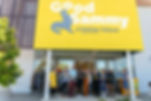Recycling Textiles in Mandurah: What Locals Need to Know
- SevenC's Admin
- Aug 11
- 3 min read
For the Lazies - A 30-Second Summary
Textile waste is a growing issue in Mandurah. Local households, businesses, and schools contribute thousands of tonnes of discarded clothing and fabrics each year. With limited recycling options, many of these items end up in landfills. But Mandurah has an opportunity to turn the tide. Through community action, smarter recycling choices, and the arrival of SevenC’s Recycling facility in 2026, locals can help reduce textile waste, support WA’s circular economy, and lead the way in sustainable living.
Why Textile Recycling Matters in Mandurah
Mandurah is one of Western Australia’s fastest-growing regional cities. With that growth comes increasing demand for sustainable waste solutions. Textile waste is a hidden contributor to landfill volumes. On average, Australians discard nearly 23 kilograms of textiles per person annually, according to ABC News. Many of these items could be recycled, reused, or repurposed.
Without proper systems in place, most unwanted clothing from Mandurah homes ends up in the general rubbish. Synthetic fabrics, in particular, take decades or even centuries to break down. This poses long-term environmental risks for our waterways, soils, and ecosystems.

What Options Are Currently Available?
At present, textile recycling in Mandurah is limited. Some clothing retailers offer take-back schemes, and second-hand stores accept wearable garments. However, damaged, worn-out, or unwearable fabrics are harder to dispose of responsibly.
Residents can reduce waste by donating to op shops, repairing items, and repurposing textiles for other uses. Community events, such as swap meets and clothing repair workshops, are growing in popularity, but more infrastructure is needed to manage textile waste at scale.

How SevenC’s Recycling Will Support Mandurah
In 2026, SevenC’s Recycling will open a state-of-the-art facility. This will be WA’s first mechanical polyester textile recycling plant capable of processing hard-to-recycle fabrics into reusable materials.
For Mandurah locals, this means increased access to textile drop-off points and community recycling programs. The facility will serve as a regional hub supporting towns across the Peel region. Schools, businesses, and households will all benefit from new waste diversion options and educational outreach.
Steps Mandurah Residents Can Take Now
You do not have to wait until 2026 to make a difference. Here are a few ways locals can help reduce textile waste today:
Donate clean, gently used clothing to local op shops
Host or join community clothing swaps
Repair clothes instead of discarding them
Use natural fibre clothing when possible, as they decompose faster
Ask your local council about supporting textile recycling bins
Community awareness and behaviour change are key. The more residents understand the impact of textile waste, the more likely they are to adopt sustainable habits.
Mandurah’s Role in WA’s Circular Economy
WA’s Waste Avoidance and Resource Recovery Strategy 2030 places emphasis on regional participation. Mandurah, as a thriving coastal city, is perfectly positioned to support the state’s transition to a circular economy. By connecting with regional recycling infrastructure and encouraging community involvement, Mandurah can become a leader in textile recovery.
Supporting initiatives like SevenC’s Recycling and local sustainability groups not only helps the environment but also boosts the local economy through job creation and green innovation.
The Road Ahead
Mandurah has the community energy and environmental awareness to become a model for sustainable living in regional WA. With the right partnerships and infrastructure, the city can play a critical role in reducing the textile waste burden on our state.
Stay informed, get involved, and let your council know that textile recycling matters. The future of WA’s sustainability starts with local action, and Mandurah is already on the path.
